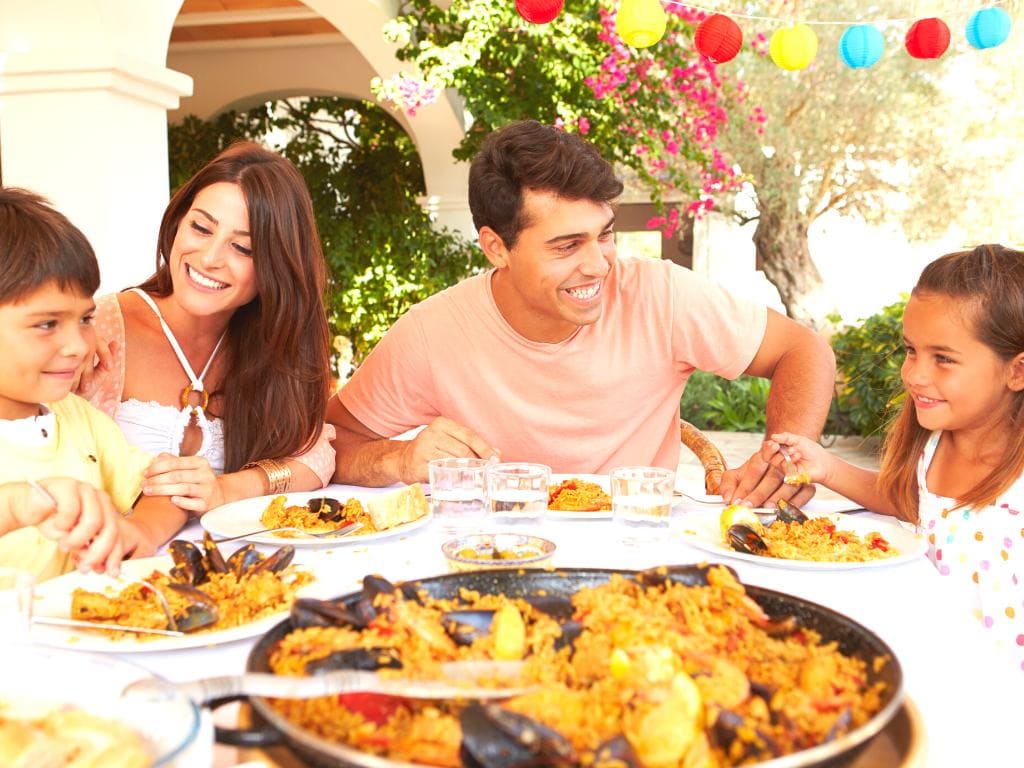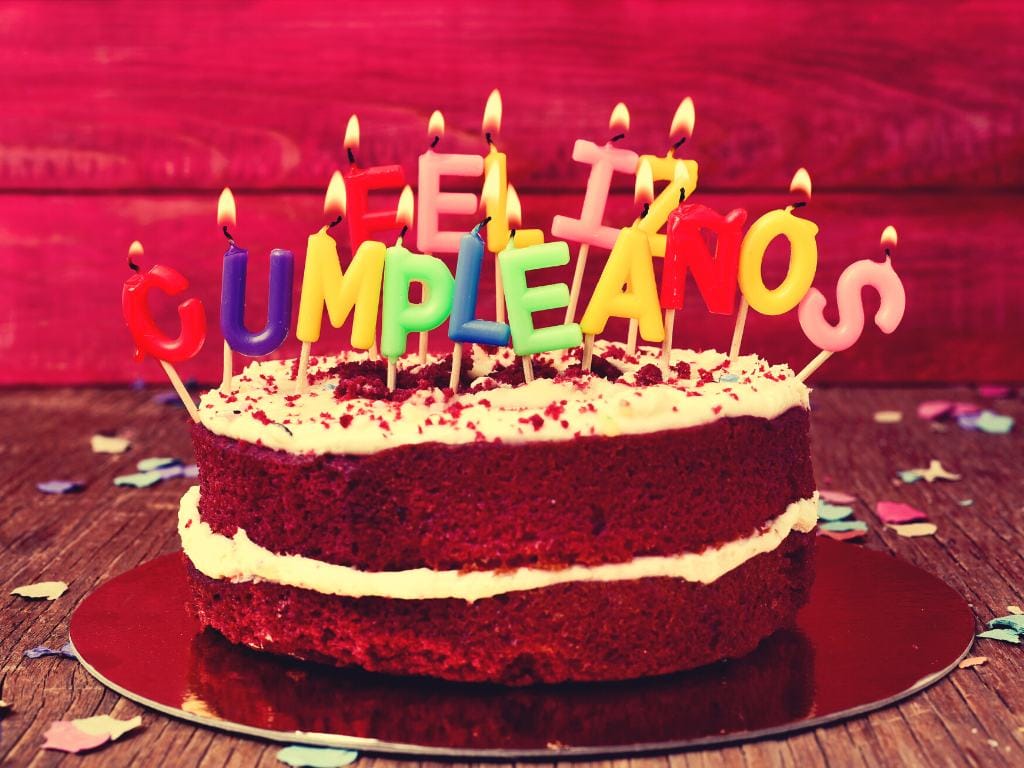Birthday in Spain: 13 Fun Birthday Traditions in Spain
How are birthdays celebrated in Spain? What are some Spanish birthday traditions? Find out here!
In many countries, birthdays are an important day to celebrate. However, not every country has the same birthday traditions.
As someone who has lived in Spain, I’ve experienced firsthand the unique birthday traditions of this country—some of which are the same as in the United States and others that are distinct.
Overall, in Spain, birthdays are considered a special occasion. They offer an opportunity to gather with family and friends to make the birthday boy or birthday girl feel loved.
In this article, we’ll dive into 13 birthday traditions in Spain. With these insights, you’ll be ready to celebrate birthdays when visiting or living in Spain!
13 Birthday Traditions in Spain
Headed to Spain to celebrate your birthday? Here are thirteen common birthday traditions in Spain:
1. The Birthday Person Pays for the Celebration

While friends or family usually organize and pay for birthdays in the US, things are different when it comes to birthday celebrations in Spain.
As a matter of fact, the person celebrating their birthday is expected to pay for the celebration!
This means that the guest of honor will invite their friends and family to a restaurant or bar and take care of the bill themselves.
This is called “invitar” or “to invite.” If you spend any time in Spain, you’ll realize it’s common to “invite” others to a coffee or beer, for example. This is similar in English to saying, “It’s on me.” or “My treat.”
Whatever you do, respect the honoree’s wishes. In other words, don’t insist on paying if she “invites” you. It’s her joy to do so! (And don’t forget, it’s your turn to buy on your birthday!)
One last thing, the idea of “inviting” refers to adults (or any one old enough to carry some euros!). Obviously, parents would arrange parties for their children and pay for decor, food, and drink.
If in school or at work, the birthday boy or girl brings the treats to share with others.
2. Ear-pulling

April Fool’s Day in Spain isn’t the only day for trickery in the country…
If you’re invited to a Spanish friend’s birthday celebration, don’t be surprised if his friends and family pull on his ears!
The tradition of ear pulling is expected on your birthday in Spain, and he won’t think anything of it.
The custom goes that the birthday boy is pulled by his ears, one for each year, plus one good yank for good luck and a long life. Naturally, the more rambunctious your friends are, the harder the ear pulls!
This Spanish birthday tradition is called “los tirones de oreja” in Spanish.
3. Celebrating on the Weekend
In Spain, birthdays aren’t typically celebrated on the actual date of birth, especially if it falls on a weekday.
Rather, the birthday person will celebrate on the weekend closest to the date. In other words, if your birthday falls on a Tuesday, you may have to celebrate that weekend.
If a Spanish person is busy or wants to travel home to celebrate with family, it’s not uncommon to celebrate any time during the month.
The point is that people celebrate on a date when your family and friends can party together.
4. Giving Birthday Gifts

Gift-giving is a big part of Spanish birthday celebrations.
That said, you’re not expected to bring an extravagant birthday gift (regalo de cumpleaños) to a birthday party.
Unlike in some countries, Spain places more emphasis on the meaning of the gesture over monetary value. As you’ve heard, it’s the thought that counts!
To emphasize, a small gift or token, even flowers or a bottle of wine (something to share immediately) is appropriate. Although, family members may give nicer gifts.
For adults, friends sometimes go in together to purchase something more substantial.
When celebrating your birthday in Spain, it’s customary to open the gifts you receive immediately in front of the person(s) who gave them to you. That way, they can see your reaction and you can express your gratitude.
5. Singing the Birthday Song in Spain
Guests at the birthday party will sing the birthday song to the honoree, just as they do in many other countries. However, there are different versions of the song in different countries.
The Spanish version of “Happy Birthday” is “Cumpleaños Feliz.” It is sung with the same melody as the English version but with different lyrics.
Here are the lyrics to “Cumpleaños Feliz” as sung in Spain:
| Spanish Lyrics | English Lyrics |
| Cumpleaños feliz, cumpleaños feliz, te deseamos todos, cumpleaños feliz | Happy birthday, happy birthday, we wish you all, happy birthday |
Interestingly, the Spanish version of the Happy Birthday song doesn’t include the birthday person’s name!
Want to know how to sing Happy Birthday in Spanish? Listen to the Spanish birthday song ⤵
6. Celebrating Name Days in Spain
If you’re wondering, “Do Spanish people really have two birthdays?” here’s your opportunity to find out!
In addition to birthdays, some Spaniards also celebrate their name day (onomastico). This is a long-standing tradition in Spain.
Name days are often seen as a type of second birthday.
This is the feast day (Saints Day or Día del Santo) of the saint they are named after. This could be their actual name, as many Spaniards are named after biblical figures. Or, someone may choose a patron saint while going through Confirmation in the Catholic Church.
For example, if someone is named Peter (Pedro in Spanish), he would celebrate his Saint’s Day on June 29, St. Peter’s liturgical feast day.
While it depends on the family, name days are often celebrated among family and friends. This could include going to church, having a meal together, or receiving small trinkets or well wishes.
7. Family is Invited

Since family plays a central role in Spanish culture, it’s no surprise that they’d be a part of Spanish birthday traditions.
Family members often gather together to celebrate birthdays in Spain. That means your Spanish friends may throw a joint party, or hold two parties (one for friends and/or colleagues and one for family).
If their family lives far away, they will very likely go home sometime during their birthday month to celebrate.
This is certainly different from the United States, where you typically celebrate your birthday with whoever is nearby that day, be it family and/or friends.
8. Blowing out the Candles on the Cake

Many people wonder if they have birthday cakes in Spain. The answer is yes, they have birthday cakes in Spain. In Spanish, birthday cake is called la tarta de cumpleaños.
While the type of cake can vary, popular choices in Spain include chocolate cake, sponge cake (bizcocho), or a variety of pastries. Additionally, some regions of Spain may have their own traditional birthday cake recipes or preferences.
The cake may or may not be decorated, but it will have candles indicating the number of years the honoree is celebrating.
Just like in the United States, the birthday person makes a wish before blowing out the candles. If they manage to blow them all out, their wish will come true!
9. Eating Together

As food is a deeply ingrained part of Spanish culture, it’s very common to share a meal together during Spanish birthday parties.
Some like to go out to eat to mark the special occasion, whereas others throw a small gathering at home.
The cuisine at Spaniard’s birthdays varies widely based on personal preferences, family traditions, and regional influences.
Paella, a traditional Spanish rice dish of saffron, meat or seafood, and vegetables, is something that some Spaniards have at their birthday party.
This isn’t because it’s traditional to eat paella on your birthday. Rather, a big pan of paella is a good dish to feed many people! Thus, it’s often associated with gatherings, festivals, and other special occasions (but not birthdays, specifically).
10. Drinking Local Beverages

While alcohol is by no means a requirement at a birthday party (and certainly not for those under the legal drinking age in Spain), it’s an important part of Spanish culture.
Spanish wines, such as Rioja and Tempranillo, are good choices for toasting the birthday person as is cava (Spain’s very own sparkling wine). Look up how to toast in Spanish, and you’ll be all set to commemorate your friend’s big birthday!
Other popular drinks in Spain are Sangria, beer, or soft drinks. At high-end parties, you might find specialty cocktails or mocktails.
Ultimately, the choice of drinks at a birthday celebration in Spain is flexible. Be sure to tailor them to suit the tastes and preferences of the host and guests.
11. Throwing a Birthday Party

It’s no secret that Spanish people love life, family, and celebrations. Therefore, it’s common for people to throw birthday parties in Spain to show affection for the honoree (at any age).
That stated, “birthday party” can be defined in many ways.
For children, parents often organize a themed party which is typically held at home or a local park. Friends from school are invited over for fun, cake, and other treats.
As for young adults, it’s very common to go out to bars or discos (clubs) to celebrate with friends and enjoy a few alcoholic beverages. (In the case that a young person couldn’t afford to pay for an entire night out, they may buy the first round, for example.)
Many adults opt for lunch or a night in with family and closest friends—something low-key. After all, it’s the company that really matters.
12. Giving Birthday Wishes

When it is a person’s birthday, you’ll of course need to congratulate them!
Wish the honoree a happy birthday by giving them two kisses (one on each cheek) and say one of these phrases:
—¡Feliz cumpleaños! – Happy birthday!
—¡Feliz cumple! – Happy birthday!
—¡Felicidades! – Congratulations!
—¡Que cumplas muchos más! – May you have many more!
If it’s your birthday, and you hear these phrases, it’s appropriate to respond with “Gracias” (Thank you) or “Muchas gracias” (Thank you so much).
In this respect, celebrating birthdays in Spain is similar to most of the world.
13. Decorating with Balloons
Some Spanish families decorate the home for the birthday person. This may include placing a balloon outside with the number of years the birthday boy or girl is turning so that the neighbors can wish him or her a Happy Birthday!
This custom depends on the family’s preferences and the region.
Birthday in Spain: Frequently Asked Questions
Still have questions about how Spain celebrates birthdays? Read the FAQ:
Do Spanish people give birthday cards?
No, Spanish people do not typically give birthday cards. However, it’s not totally unheard of and is becoming a little more common. It’s also not expected to send a thank-you note for a small gift. Of course, both are appreciated in addition to being a way to share a custom from America with your new Spanish friends.
Is it rude to ask a Spaniard their age?
In Spain, asking someone their age can be considered impolite, similar to many other cultures around the world. A personal question, people may be uncomfortable sharing their age with new acquaintances. However, whether it’s considered rude or not can also depend on the context and your relationship with the person. For example, if you are friends or they have invited you to their birthday party, it might be appropriate to ask.
How do you say Happy Birthday in Spain?
The most common way to say Happy Birthday in Spanish is “Feliz Cumpleaños.” It is customary to say this phrase to the birthday girl or birthday boy on their special day.
Do they have piñatas in Spain?
Some families of children do have piñatas at their birthday parties. However, in Spain, it’s customary for the piñata to have a small compartment with strings on the bottom. When you pull the strings, the candies fall out as opposed to in Mexico where you hit the piñata with a stick until it bursts open.
Do you have to celebrate your birthday in Spain?
While you don’t have to celebrate your birthday in Spain if you don’t want to, most people do in some way.
How do Spanish people count birthdays?
Like most of the West, babies in Spain are zero when they are born. Each year, they turn a year older on their birthday.
What is the most common birthday in Spain?
Since the 90’s, the month of September is the month in which the most people are born in Spain. September 24th is the most popular birth date in September. Overall, the most popular birthday in Spain is January 1st. (Source: INE)
Final Thoughts on Spanish Birthday Traditions
Now that you’ve learned some Spain birthday traditions, you’re ready to celebrate birthdays with Spanish friends in a culturally appropriate manner! Whether you’re visiting for a semester or moving abroad, birthdays in Spain are a fun and festive occasion that you’ll get to take part in!
More Practical Information on Spain
Going to Spain? Here are some related articles to help. ⤵
